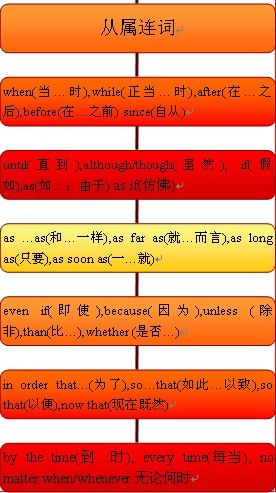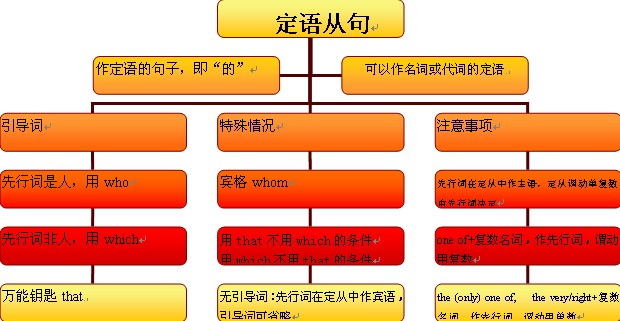本试题 “The reason ______ he went to California was ______ he had been looking forward to finding gold.[ ]A. which; thatB. why; becauseC. why; thatD. that;...” 主要考查您对关系副词
从属连词
限制性定语从句
等考点的理解。关于这些考点您可以点击下面的选项卡查看详细档案。
- 关系副词
- 从属连词
- 限制性定语从句
关系副词的概念:
关系副词兼有副词与连接词两种作用,在不及物动词的连接中要求用关系副词。关系副词有when, where, why。
关系副词的特点:
关于副词用于引出定语从句,主要有when, where, why:
如:Sunday is the day when very few people go to work. 星期日是没什么人上班的日子。
That's the reason why he dislikes me. 这就是他不喜欢我的原因。
Do you know a shop where I can find sandals? 你知道哪家商店我能找到凉鞋吗?
注:关系副词用于引出定语从句,且在从句中用作状语。关系副词when表示时间,where表示地点,why表示原因。
使用关系副词应注意的几点:
(1)how不能用作关系副词,不要想当然地将how用作关系副词置于theway后表示方式:他说话就是那个样子。
误:This is the way how he spoke.
正:This is how he spoke./ This is the way(that, in which)he spoke.
(2)关系副词when和where既可引导限制性定语从句,也可引导非限制性定语从句,但why只能引导限制性定语从句,不能引导非限制性定语从句(若引导非限制性定语从句,可用for which reason)。
(3)引导定语从句时,when的先行词为时间,where的先行词为地点,why的先行词为原因(主要是the reason),但是反过来却不一定:
如:Don't forget the time(that) I've toldyou.不要忘记我告诉你的时间。
Do you know the house(that) he bought recently? 你知道他最近买的那座房子吗?
Please tell me there as on(that) you know. 请告诉我你所知道的原因吧。
关系副词的用法:
关系副词有when, where, why,作用有三个:
1、连接主句与从句;
2、代替先行词;
3、在从句中作状语,不可省略。
When和where既可引导限制性定语从句,也可引导非限制性定语从句。Why只能引导限制性定语从句。这些关系副词在意义上都相当于一定得“介词+which”结构。
1)when=at/in/on/during,在定语从句中作时间状语。
例如:Tell me the time when(at which) the train leaves.
注意:
①当表示时间的先行词在从句中中作主语或宾语时,不能用when。
例如:I will never forget the days I spent with your family.
②It/This/That+be+the first/second/last time that…句型中,that是习惯用法,不能用 when代替,that还可以省略。从句中使用与“be动词”呼应的完成形式。
例如:It is the first time that I have been to the Great Wall.
2)where表地点,只能跟在表示地点的名词后,它在定语从句中作地点状语。
例如:This is the second school where I used to teach.
注意:
①引导词where可用that替换,并经常可以省略。
例如:That's the place(where/that) we went before.
②当表示地点的先行词在句中作主语或宾语时,不用where,用关系代词that或which。
例如:The factory that/which we visited yesterday was built last year.
③where可与from连用。
例如:His head soon appeared out of the second story windows, from where he could see nothing but rees.
3)why表原因,引导的从句修饰名词reason。Why可用that或forwhich替换或省略。
例如:I don't know the reason(why/for which/that) he left here.
从属连词的概念:
连词用于引导从句以形成句子的一部分或修饰句子的构成要素的叫作从属连词。
英语从属连词用法分类详解:
1、引导时间状语从句的从属连词:
(1)表示“当…时候”或“每当”的时间连词。主要的when, while, as, whenever:
如:He jumped up when the phone rang. 电话铃响时他吓了一跳。
We listened while the teacher read. 老师朗读时我们听着。
The phone rang just as I was leaving. 我正要离开,电话铃就响了起来。
(2)表示“在…之前(或之后)”的时间连词。主要的有before, after:
如:Turn the lights off before you leave. 离开前请关灯。
He started the job soon after he left the university. 他大学毕业后就开始做这份工作。
(3)表示“自从”或“直到”的时间连词。主要的有since, until, till:
如:He has lived here since he got married. 他结婚后就一直住在这儿。
Most men worked until[till] they're 65. 大多数男人工作到65岁。
(4)表示“一…就”的时间连词。主要的有as soon as, the moment, the minute, the second, the instant, immediately, directly, instantly, once, no sooner…than, hardly…when等:
如:Tell him the news as soon as you see him. 你一见到他就把这消息告诉他。
I recognized her the moment(that) I saw her. 我一看到她就认出她来了。
I want to see him the minute(that) he arrives. 他一到来我就要见他。
I went home directly I had finished work. 我一干完活就回家了。
Once he arrives, we can start. 他一来我们就可以开始。
(5)表示“上次”、“下次”、“每次”等的时间连词。主要的有every time(每次),each time(每次),(the) next time(下次),any time(随时),(the) last time(上次),the first time(第一次):
如:Last time I saw him, he looked ill. 上次我见到他的时候,他好像有病。
Next time you're in London come and visit us. 你下次来伦敦过来探望我们。
Do look me up next time you're in London. 你下次到伦敦来,一定来找我。
Every time I call on him, he is out. 我每次去访问他,他都不在。
You can call me any time you want to. 你随时都可以给我打电话。
【注】every time,each time,any time前不用冠词,(the)next time, (the)last time中的冠词可以省略,而the first time中的冠词通常不能省略。
2、引导条件状语从句的从属连词:
这类连词主要有if, unless, as[so] long as, incase等:
如:If anyone calls tell them I'm not at home. 要是有人打电话来,就说我不在家。
You will fail unless you work hard. 你若不努力就会失败。
As[So] long as you need me, I'll stay. 只要你需要我,我就留下。
In case I forget, please remind me about it. 万一我忘记,请提醒我一下。
【注】在条件状语从句中,通常要用一般现在时表示将来意义,而不能直接使用将来时态。不过,有时表示条件的if之后可能用will,但那不是将来时态,而是表示意愿或委婉的请求(will为情态动词):
如:If you will wait a moment, I'll fetch the money. 请等一下,我就去拿钱。
3、引导目的状语从句的从属连词:
主要有in order that, so that, in case, for fear等:
如:We used the computer in order that we might save time. 我们使用计算机是为了节约时间。
Speak clearly so that they may understand you. 说清楚,以便让他们能明白你的意思。
Be quiet in case you should wake the baby. 安静些,免得把婴儿吵醒。
He is working hard for fear he should fail. 他努力工作以免会失败。
4、引导结果状语从句的从属连词:
主要的有so that, so…that, such…that等:
如:We're all here now, so that the meeting can begin at last. 我们现在都到齐了,终于能开会了。
It's so difficult a question that none of us can answer it. 那是一个很难的问题,我们没有一个人能回答。
He shut the window with such force that the glass broke. 他关窗户用力很大,结果玻璃震破了。
【注】so that中的that在口语中通常可以省略。
5、引导原因状语从句的从属连词:
主要的有because, as, since, seeing(that), now(that), considering(that)等:
如:He couldn't got to school because he had a cold. 他因患感冒而未能去上学。
Since everybody is here, let's begin our discussion. 大家都到了,我们就开始吧。
Seeing that it is 8o'clock, we'll wait no longer. 由于时间已到8点,我们将不再等了。
Now that you are here, you'd better stay. 你既然来了,最好还是留下吧。
6、引导让步状语从句的从属连词:
主要有although, though, eventhough, even if, while, however, whatever, whoever, whenever, wherever等:
如:Although[Though] he is poor, he is well contented. 他虽穷却能知足常乐。
Though[Even though] it's hard work, I enjoy it. 尽管是苦活,但我乐意干。
Even if you don't like wine, try a glass of this. 即使你不喜欢喝酒,也尝尝这杯吧。
7、引导方式状语从句的从属连词:
主要有as, like, as if, as though, the way等:
如:Do it as[like] he does. 像他那样做。
He behaved as if nothing had happened. 他装作若无其事的样子。
They treat me as though I were a stranger. 他们待我如陌生人。
Nobody else loves you the way(=as) I do.没有人像我这样爱你。
8、引导地点状语从句的从属连词:
主要有where, wherever, everywhere等:
如:There were lots of parks where I lived. 我住的地方有许多公园。
Sit wherever you like. 你想坐在那儿就坐在那儿。
Everywhere they went, they were warmly welcomed. 他们每到一个地方都受到热烈欢迎。
9、引导比较状语从句的从属连词:
主要有than和as…as:
如:It's easier than I thought. 这比我想像的要容易。
They are as often wrong as they are right. 他们错对各半。
10、引导名词性从句的从属连词:
主要有that, if, whether:
如:It is clear enough what he meant. 他是什么意思很清楚。
Your greatest fault is that you are careless. 你最大的缺点是粗心大意。
Whether it will do us harm remains to be seen.是否对我们有害还要看一看。
She didn't say if he was still alive. 她没说他是否还活着。
从属连词知识体系:

用作从属连词的六类名词结构:
英语中有些名词结构可用作从属连词,用以引导状语从句,且主要是时间状语从句。这类结构归纳起来有以下六类:
一、the+瞬间名词:
其中的瞬间名词主要包括moment, minute, instant, second等,其意为“一……就……”,相当于as soon as。
如:The minute he saw her he fell in love. 他对她一见倾心。
Telephone me the moment(that) you get the results. 你一有结果,马上给我打电话。
I was so tired that I fell asleep the instant I closed my eyes. 我很累,一合上眼就睡着了。
Sheputdownthereceiverthesecondsherecognizedmyvoice.她一听出是我的声音,马上就放下电话听筒。
注:其中的瞬间名词后可接that,也可省略。另外,有的个别副词(如directly/immediately等)也可表示类似意思。
如: Immediately the meal was over,he switchedon the radio.饭一吃完他就把收音机打开。
二、the+季节名词:
其中的季节名词包括spring,summer,autumn,winter,其意为“在……的那年春天、夏天、秋天、冬天。
如:His wife left him thes pring he went abroad.在他出国的那年春天,他的妻子离开了他。
He sold his house and went to the souththe summer he lost hisjob.在他失业的那年夏天,他卖掉房子去了南方。
He was sentto prison the winter his third daughter was born.在他第三个女儿出生的那年冬天,他被关进了监狱。
She got married the autumn she graduated from college.她大学毕业的那年秋天就结婚了。
三、the+时间名词:
其中的时间名词主要包括hour,day,night,week,month,season,year等,其意为“在……的时候、那天、那个晚上、那周、那个月、那个季节、那年”。
如: The hour he wa sin her office,he felt very sad.当他在她办公室的时候,他感到很伤心。
The day here turned home,his father was already dead.他回家的那一天,他的父亲已经死了。
The night I wenttoseeher,shehadleftforBeijingtoattendanimportantmeeting.就我去看她的那个晚上,她到北京去开一个重要的会议了。
Mr Smith didn't go to work the week his wife was ill.史密斯先生在他妻子生病的那个星期没去上班。
They ear helivedinthecountry,he learned alot.他在乡下呆的那一年,他学到了不少东西。
四、the+序数词+time
其中的序数词包括first,second,third,fourth等,其意为“当第几次……的时候”。
如: My girlfriend beat me at pokert he first time weplayed.我头一次和女朋友打扑克,她就把我赢了。
These cond time I saw her,she looked like an old woman.我第二次见到她时,她看上去像一个老太婆。
The third time I went there,I found all of them had left and the offices were all empty.我第三次去那儿时,我发现他们都离开了,所有的办公室都是空的。
注:
1.next,last也具有类似序数词的性质,因此也具有以上用法。
如: Nexttimeyoucomein,pleaseclosethedoor.下次你进来,请关门。
Thelasttimewetalkedhesaidheneededanothertwodays.上次我们谈话时他说他还需要两天。
2.thefirsttime,thesecondtime,thethirdtime等用作连词引导时间状语从句时,其前通常要有定冠词,而(the)nexttime,(the)lasttime引导状语从句时,其中的冠词可以省略,如下面这道上海高考题,其答案是C,不是A:
I though ther nice and honest______Imether.
A.first time B.fo rthe first time C.the first timeD.by the first time
五、不定代词+time
其中的不定代词主要包括each,every,any等。
如:Every time I ringher,the phone is engaged.我每次给她打电话,电话都占线。
Every time I see him he either wants to tell me his trouble or borrow some money.每次我见到他,他不是向我诉苦,就是要向我借钱。
He felt nervous each times he spoke to him.每次她和他讲话,他都感到紧张。
AnytimeyoucometoLondondolookmeup.你无论什么时候到伦敦来,一定要来看我。
注意:everytime,eachtime,anytime用作连词引导状语从句时其前习惯上不用冠词,它与the first time,these cond time,the third time等引导时间状语从句时其前必须要用定冠词不同。
六、其他名词结构
以上归纳的名词结构均用于引导时间状语从句,有些其他结构还可引导其他性质的状语从句,如the way可用于引导方式状语从句,表示“像……一样”。如:
The didn’t do it the way we do now.那时他们不像我们现在这样行事。
Joyce looked at me the way alotof girls did.乔伊丝像许多姑娘那样瞧着我。
注:这样用的theway与as用法相似。
如:Hold itin both hands,the way(=as)Mummy does.用两只手捧住,像妈妈那样。
限制性定语从句的概念:
限制性定语是指对被修饰名词或代词的必需修饰,是被修饰名词或代词不可缺少的修饰语,如果去掉它句子意思往往会不明确或会发生变化。
如:The travellers knowing about the floods took another road. 知道发大水的那些游客改道走了。
The boys wanting to play football were disappointed when it rained. 想踢足球的那些男孩子因为下雨而感到失望。
关系代词引导的定语从句:
关系代词所代替的先行词是人或物的名词或代词,并在句中充当主语、宾语、定语等成分。关系代词在定语从句中作主语时,从句谓语动词的人称和数要和先行词保持一致。
1)who, whom, that 这些词代替的先行词是人的名词或代词,在从句中所起作用如下:
例:Is he the man who/that wants to see you? 他就是你想见的人吗?(who/that在从句中作主语)
He is the man whom/that I saw yesterday. 他就是我昨天见的那个人。(whom/that在从句中作宾语)
2)Whose用来指人或物,(只用作定语,若指物,它还可以同ofwhich互换)
例:They rushed over to help the man whose car had broken down. 那人车坏了,大家都跑过去帮忙。
Please pass me the book whose(of which) coverisgreen. 请递给我那本绿皮的书。
3)which, that 它们所代替的先行词是事物的名词或代词,在从句中可作主语、宾语等。
例如:A prosperity which/that had never been seen before appears in the countryside. 农村出现了前所未有的繁荣。(which/that在句中作宾语)
The package(which/that) you are carrying is about to come unwrapped.你拿的包快散了。(which/that在句中作宾语)
关系副词引导的定语从句:
关系副词可代替的先行词是时间、地点或理由的名词,在从句中作状语。
1)when, where, why 关系副词when, where, why的含义相当于“介词+which”结构,因此常常和“介词+which”结构交替使用。
例如:There are occasions when(on which) one must yield.任何人都有不得不屈服的时候。
Beijing is the place where(inwhich) I was born. 北京是我的出生地。
Is this the reason why(for which) he refused our offer? 这就是他拒绝我们帮助他的理由吗?
2)that代替关系副词 that可以用于表示时间、地点、方式、理由的名词后取代when, where, why和“介词+which”引导的定语从句,在口语中that常被省略,
例如:His father died the year(that/when/in which) he was born. 他父亲在他出生那年逝世了。
He is unlikely to find the place(that/where/in which) he lived forty years ago. 他不大可能找到他四十年前居住过的地方。
限定性定语与非限定性定语的区别:
1、形式不同:
限定性定语从句主句和从句之间不用逗号隔开,口语中使用时也不停顿;而非限定性定语从句与主句之间通常有逗号隔开,口语中使用时有停顿。
2、功能不同:
限定性定语从句用于对先行词的意义进行修饰、限制和识别,如果去掉,就会造成句意不完整或概念不清;而非限定性定语从句用于对先行词起补充说明作用,如果省略,句意仍然清楚、完整:
如:People who take physical exercise live longer. 进行体育锻炼的人活得长些。(若把从句去掉句子就失去意义)
His daughter, who is in Boston now, is coming home next week. 他女儿现在在波士顿,下星期回来。(若把从句去句子意义仍然完整)
3、翻译不同:
在翻译定语从句时,一般把限定性定语从句翻译在它所修饰的先行词之前,而把非限定性定语从句与主句分开:
如:He is the man whose car was stolen. 他就是汽车被窃的那个人。
I've invited Jim, who lives in the next flat. 我邀请了吉姆,他就住在隔壁。
4、含义不同:
如:I have a sister who is a doctor. 我有一个医生的姐姐。(姐姐不止一个)
I have a sister, who is a doctor. 我有一个姐姐,她是当医生的。(只有一个姐姐)
5、先行词不同限定性定语从句的先行词只能是名词或代词,而非限定性定语从句的先行词则可以是名词或代词,也可以是短语或句子;
另外,当先行词为专有名词或其他具有独一无二性的普通名词时,通常要用非限制性定语从句,而不用限制性定语从句:
如:Peter drove too fast, which was dangerous. 彼得开车很快,这是很危险的。(which指drive too fast)
He changed his mind, which made me very angry. 他改变了主意,这使我很生气。(which指整个主句)
Mr.Smith, who is our boss, will leave for Japan next week. 我们的老板史密斯先生下周要去日本。(先行词为专有名词,要用非限制性定语从句修饰)
Her father, who has a lot of money, wishes her to study abroad. 她父亲很有钱,希望她出国学习。(先行词为表独一无二意义的普通名词,要用非限制性定语从句修饰)
6、关系词不同:
关系词that和why可用于限制性定语从句中,通常不用于非限制性定语从句;另外,在限制性定语从句中,关系词有时可以省略,而在非限制性定语从句中关系词一律不省略。
判断关系代词与关系副词方法:
一:用关系代词,还是关系副词完全取决于从句中的谓语动词。及物动词后面无宾语,就必须要求用关系代词;而不及物动词则要求用关系副词。
例如:This is the mountain village where I stayed last year.
I'll never forget the days when I worked together with you.
判断改错
(错)This is the mountain village where I visited last year.
(错)I will never forget the days when I spent in the countryside.
(对)This is the mountain village(which) I visited last year.
(对)I'll never forget the days(which) I spent in the countryside.
注:习惯上总把表地点或时间的名词与关系副词where, when联系在一起。此两题错在关系词的误用上。
二:准确判断先行词在定语从句中的成分(主、谓、宾、定、状),也能正确选择出关系代词/关系副词。
例1. Is this museum ___ you visited a few days age?
A. where
B. that
C. on which
D. the one
例2. Is this the museum ____ the exhibition was held.
A. where
B. that
C.on which
D. the one
答案:例1:D,例2:A
例1变为肯定句:This museum is___ you visited a few days ago.
例2变为肯定句:This is the museum ___ the exhibition was held.
注:在句1中,所缺部分为宾语,而where, that, on which都不能起到宾语的作用,只有the one既做了主句的表语,又可做从句的宾语,可以省略关系代词,所以应选D。
而句2中,主、谓、宾俱全,从句部分为句子的状语表地点,既可用副词where,又因in the museum词组,可用介词in+which引导地点状语。
而此题中,介词on用的不对,所以选A。关系词的选择依据在从句中所做的成分,先行词在从句中作主、定、宾语时,选择关系代词(who,whom,that,which,whose);
先行词在从句中做状语时,应选择关系副词(where地点状语,when时间状语,why原因状语)。
定语从句知识体系:

关系代词that的用法:
1)不用that的情况:
a)在引导非限定性定语从句时。
如:(错)The tree, that is four hundred years old, is very famous here.
b)介词后不能用:
如:We depend on the land from which we get our food.
We depend on the land that/which we get our food from.
2)只能用that作为定语从句的关系代词的情况
a)在there be句型中,只用that,不用which。
b)在不定代词,如:anything, nothing, the one, all, much, few, any, little等作先行词时,只用that,不用which。
c)先行词有the only, the very修饰时,只用that。
d)先行词为序数词、数词、形容词最高级时,只用that。.
e)先行词既有人,又有物时。
例:All that is needed is a supply of oil. 所需的只是供油问题。
Finally, the thief handed everything that he had stolen to the police. 那贼最终把偷的全部东西交给了警察。
与“The reason ______ he went to California was ______ he had...”考查相似的试题有:
- Nowadays more and more students are working directly on the Internet________different typesof courses are supplied.[ ...
- It won’t be quite a long time ________ your son is back, so don’t be worried.A.thatB.sinceC.beforeD.until
- Most volunteers are from universities, _________ it is not uncommon to see middle and primary school students too.A....
- It’s hard to avoid mistakes. _____ we realize our mistakes and do our best to correct them, that’s all right.A.As if...
- I’ve heard a whisper ______ David and Alice are going to get married.A.whatB.whichC.whoD.that
- Our school held a respect-parent activity last month, ______ our students benefited a lot.A.whenB.whereC.whichD.that
- You must learn to consult your feelings and your reason ________ you reach any decision.A.althoughB.beforeC.becaus...
- 32. Alice’s father always brings her a nice gift_______he returns home from his business trip.A.by the timeB.all th...
- 31. At that time I still felt ______ my feet were cold and _______ my hands ached terribly.A.that; thatB.that; /C....
- This is ___ book ___ I wrote.A.the only ….whichB.a very…thatC.the only…thatD.the just…which